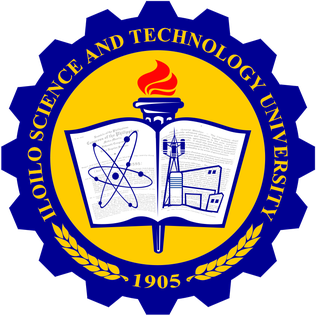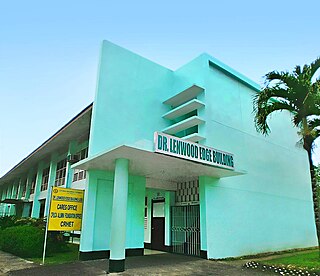
Iloilo, also called Iloilo Province, officially the Province of Iloilo, is a province in the Philippines located in the Western Visayas region. Its capital and largest city is Iloilo City, the regional center of Western Visayas and politically independent from the province. Iloilo occupies the southeast portion of the Visayan island of Panay and is bordered by the province of Antique to the west, Capiz to the north, the Jintotolo Channel to the northeast, the Guimaras Strait to the east, and the Iloilo Strait and Panay Gulf to the southwest.

De La Salle University, also referred to as DLSU, De La Salle or La Salle, is a private, Catholic coeducational research university run by the Institute of the Brothers of the Christian Schools with main campus in Taft Avenue, Malate, Manila, Philippines. It was established by the Christian Brothers in 1911 as De La Salle College (DLSC) in Nozaleda Street, Paco, Manila with Blimond Pierre Eilenbecker, FSC serving as director, and is the first De La Salle school in the Philippines. The college was granted university status on February 19, 1975, and is the oldest constituent of De La Salle Philippines (DLSP), a network of 16 educational institutions, established in 2006 replacing the De La Salle University System.

The University of San Agustin – Iloilo, also known as UniSAg or San Ag, is a private Roman Catholic institution in Iloilo City, Philippines. It is operated by the Augustinian Province of Santo Niño de Cebu, Philippines, belonging to the Order of Saint Augustine. Founded in July 1904, it started as a school for boys with 40 students. In 1917, it became Colegio de San Agustin and later achieved university status in March 1953, becoming the first university in Western Visayas and the first Augustinian university in the Asia-Pacific region.

Iloilo City, officially the City of Iloilo, is a 1st class highly urbanized city in the Western Visayas region of the Philippines, located on the southeastern coast of the island of Panay. According to the 2020 census, Iloilo City has a population of 457,626 people, making it the most populous city in Western Visayas. For the metropolitan area, the total population is 1,007,945 people.

Miriam Palma Defensor-Santiago was a Filipino scholar, academic, lawyer, judge, author, and stateswoman who served in all three branches of the Philippine government: judicial, executive, and legislative. Defensor Santiago was named one of The 100 Most Powerful Women in the World in 1997 by The Australian. She was known for being a long-serving Senator of the Republic of the Philippines, an elected judge of the International Criminal Court, and the sole female recipient of the Philippines' highest national honor, the Quezon Service Cross.

Central Philippine University is a private research university located in Jaro, Iloilo City, Philippines. Established in 1905 through the benevolent grant of the American industrialist and philanthropist John D. Rockefeller as the Jaro Industrial School and Bible School under the supervision of the American Baptist Foreign Mission Society, it is the first Baptist and second American and Protestant-founded university in the Philippines and in Asia.

West Visayas State University is a public normal research university located in La Paz, Iloilo City, Western Visayas region of the Philippines. It was established in 1924 as Iloilo Normal School under the tutelage of the Thomasites, but dates back its founding in 1902 as a part of Philippine normal school system with Iloilo National High School established by the American colonial government. It later became West Visayas State College in 1965 and acquired its university status becoming West Visayas State University in 1986.

The Philippine Science High School System is a research-oriented and specialized public high school system in the Philippines that operates as an attached agency of the Philippine Department of Science and Technology. PSHS is considered as the top science high school in the Philippines and is viewed to be among the best in the ASEAN region by 2016.
The Philippine Science High School Western Visayas Campus (PSHS-WVC), one of the campuses of the Philippine Science High School System, is located at Brgy. Bito-on, Jaro, Iloilo City, Philippines. Established in 1993, the school admits and grants scholarships to students who are gifted in the sciences and mathematics. Most of the scholars are from Western Visayas which covers the provinces of Aklan, Antique, Capiz, Guimaras, Iloilo and Negros Occidental, as well as the Mimaropa, which includes the provinces of Occidental Mindoro, Oriental Mindoro, Marinduque, Romblon and Palawan. Until the establishment of PSHS Central Visayas in 2009, the campus also catered to the students from the Central Visayas provinces of Bohol, Cebu, Negros Oriental and Siquijor.

The Technological University of the Philippines, commonly known as TUP, is a coeducational state university in the Philippines. It was established in 1901 by the Philippine Commission. TUP has its main campus in Manila and satellite campuses in Taguig, Cavite, Visayas, Batangas, and Quezon.

The Philippine Science High School Eastern Visayas Campus (PSHS-EVC) is one of the campuses of the Philippine Science High School System located at Pawing, Palo, Leyte.
13241 Biyo, provisional designation 1998 KM41, is a background asteroid from the Flora region of the inner asteroid belt, approximately 4 kilometers (2.5 miles) in diameter. It was discovered on 22 May 1998, by the Lincoln Near-Earth Asteroid Research team (LINEAR) at the U.S. Lincoln Laboratory Experimental Test Site in Socorro, New Mexico. The presumed S-type asteroid has a rotation period of 4.4 hours and likely an elongated shape. It was later named after Filipino educator Josette Biyo.

The Philippine Normal University is a public coeducational teacher education and research university in the Philippines. It was established in 1901 through Act No. 74 of the Philippine Commission "for the education of natives of the Islands in the science of teaching". It has campuses in Manila, North Luzon, South Luzon, Visayas, and Mindanao. Pursuant to Republic Act No. 9647, it is the country's National Center for Teacher Education.

The University of the Philippines Visayas is a public research university in Iloilo, Philippines. A constituent university of the University of the Philippines system, it teaches management, accountancy, marketing, economics, chemistry, applied mathematics and physics, marine science education and research, fisheries, and aquaculture. It offers regional studies programs on the preservation and enrichment of the Visayan cultural heritage.

Teresa Magbanua y Ferraris, better known as Teresa Magbanua and dubbed as the "Visayan Joan of Arc", was a Filipino schoolteacher and military leader. Born in Pototan, Iloilo, Philippines, she retired from education and became a housewife shortly after her marriage to Alejandro Balderas, a wealthy landowner from Sara, Iloilo. When the 1896 Philippine Revolution against Spain broke out, she became one of only a few women to join the Panay-based Visayan arm of the Katipunan, the initially secret revolutionary society headed by Andrés Bonifacio.

Iloilo Science and Technology University (also known as ISAT-U or ISAT) is a state research university located in La Paz, Iloilo City, Philippines. Founded in 1905 under the American colonial government of the Philippines, it is mandated and chartered as a polytechnical university by the Philippine government to provide undergraduate and graduate courses in technology education, agriculture, fishery, engineering, arts and sciences, forestry, business, health, computer, criminology, nautical and short-term vocational-technical and other continuing courses. It attained its university status in 2013 renaming it to its present name, the Iloilo Science and Technology University (ISAT-U).

The Iloilo Mission Hospital, also known as CPU–Iloilo Mission Hospital, CPU–IMH, IMH, or Mission, is a private tertiary, academic, teaching hospital in Jaro, Iloilo City, Philippines, managed and operated as the university hospital of Central Philippine University. It was established in 1901 by American missionary doctor Joseph Andrew Hall as "the first Protestant and American-founded hospital in the Philippines".

Camilo Pancratius Pascua Cascolan was a Filipino police general who served as the 24th Chief of the Philippine National Police (PNP) from September to November 2020 under President Rodrigo Duterte. After his retirement from the PNP, President Bongbong Marcos appointed him as an undersecretary of the Department of Health where he served from October 2022 until his death in November 2023. He was the first Cordilleran to lead the country's national police force.

The Central Philippine University College of Agriculture, Resources and Environmental Sciences, also referred to as CPU CARES or CPU Agriculture, is one of the academic units of Central Philippine University, a private university in Iloilo City, Philippines.

















